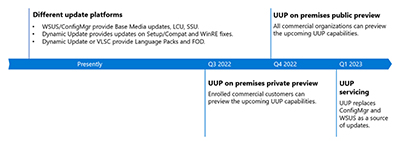News
Microsoft's On-Premises Unified Update Platform To Control All Windows Updates in 2023
Microsoft announced last week that a private preview of its Unified Update Platform (UUP) for on-premises environments is available for testing by commercial organizations.
The private preview, which requires signing up by filling out a form, likely will be something that organizations will want to try. Microsoft already has plans to update all new Windows operating systems using UUP on premises, which will start happening early next year.
"In fact, starting in early 2023, all new releases of Windows will be serviced with UUP updates," the announcement indicated.
The announcement included a timeline showing UUP on premises essentially replacing Microsoft's existing platforms used for updating Windows systems, namely Windows Server Update Services (WSUS) and Microsoft Endpoint Configuration Manager, starting in Q1 2023.
 [Click on image for larger view.] Figure 1. Microsoft's timeline showing on-premises UUP replacing other Windows update methods next year (source: July 22 Microsoft Tech Community blog post).
[Click on image for larger view.] Figure 1. Microsoft's timeline showing on-premises UUP replacing other Windows update methods next year (source: July 22 Microsoft Tech Community blog post).
The on-premises UUP addresses both "quality updates" (Microsoft's monthly software updates) and "feature updates" (new Windows OS installations).
"The Unified Update Platform (UUP) is a single publishing, hosting, scan, and download model for OS quality and feature updates for all Windows-based operating systems," the announcement explained.
Microsoft first began referencing its UUP technology back in 2016, mostly as a service that would shrink the size of Windows 10 feature updates. It was just a service used for updates, it seemed back then.
In its announcement, though, Microsoft now describes UUP on premises as integrating with, and replacing as a source for updates, Microsoft's current management tools such as WSUS and Microsoft Endpoint Configuration Manager.
UUP on premises reduces some work that was previously associated with maintaining Windows 10 and Windows 11 environments, the announcement contended. For instance, IT pros don't have to use "media-based task sequences" for Windows upgrades. OSes can be upgraded with "one reboot." Also, OS upgrades will retain prior features on demand (FOD) and language pack (LP) installations.
Microsoft also is promising improvements when applying quality updates (monthly patches and security fixes) using UUP on premises. Those perks include:
- Ability for end users to acquire FODs and LPs offline
- Automatic corruption repair
- Minimized quality update client download sizes
Even though UUP on premises was described as eventually replacing WSUS and System Center Configuration Manager for updating Windows environments, organizations testing the private preview of UUP on premises are required to use either of those products with the private preview, per the announcement's description.
For organizations using Configuration Manager, Microsoft has a minimum requirement to use version 2111 or later of that product if they want to test the UUP on premises private preview.
About the Author
Kurt Mackie is senior news producer for 1105 Media's Converge360 group.